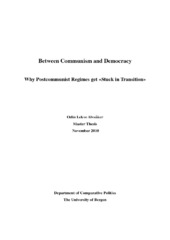| dc.description.abstract | The transitions from communist rule throughout Eastern Europe and the former Soviet Union have resulted in high regime diversity among the postcommunist regimes. Which factors may explain these differences in the political development of postcommunist regimes, and why have several of these states got «stuck in transition» as hybrid regimes? Theoretical models that have been conceived to analyse transitions from communism have been able to shed light on two of the major political pathways in the postcommunist region: those leading to either democracy or autocracy. With regard to the regimes that have got stuck in the «middle» as hybrid regimes, far less significant explanations have been found, which most likely can be attributed to the apparently higher regime diversity among these regimes. Thus, the structure of this thesis is twofold: First, theories regarding transitions from communism as well as general theories of democratization are reconstructed as independent variables, and their relative impact on the dependent variable (regime types) in 1994 and in 2008 are assessed in two correlation analyses. Second, a qualitative operationalisation of regime types is combined with case studies of the hybrid postcommunist regimes, in order to compare and analyse their political development. In the quantitative analyses, where scores from Freedom House were used to measure the dependent variable, the majority of the hypotheses were confirmed, as existing theories largely accounted for the political trajectories of authoritarian and democratic regimes, whereas the hybrid regimes were poorly explained. However, when applying the qualitative case study approach, it became possible to identify several variables that may explain not only why several postcommunist countries turned into hybrid regimes, but also the varying degrees and types of democraticness that have emerged among these regimes during the last two decades. | en_US |
